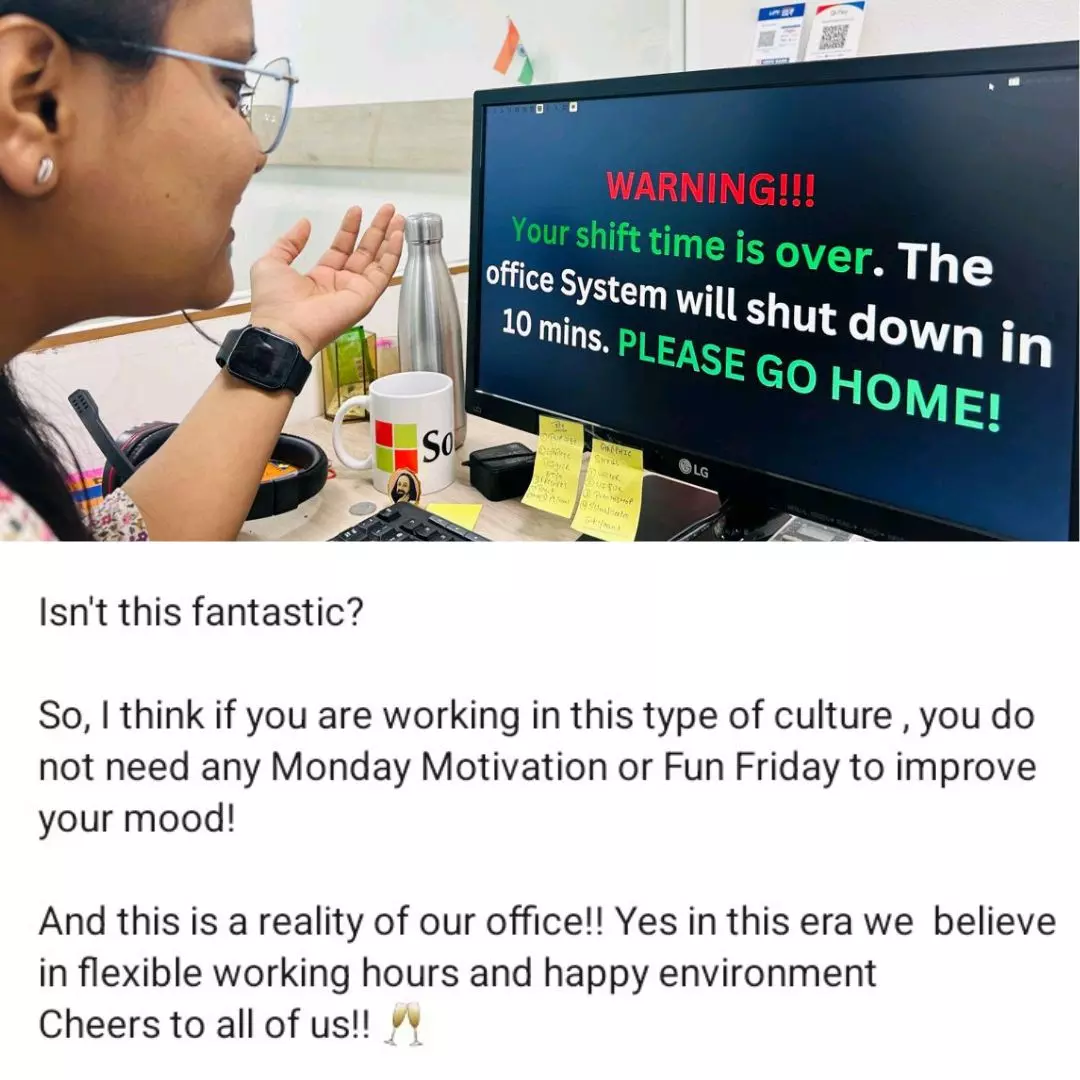For many employees, the work-life balance often blurs with employers, making them work overtime and unusual shifts. While companies preach about their workers’ mental health, very few take steps toward achieving a healthy work environment.
A LinkedIn user, Tanvi Khandelwal, introduced social media users to one such place that uniquely reminds their employees as their working hours come to an end. The post is now viral and has been receiving mixed reactions and over 3,00,000 responses.
No More Monday Blues
Khandelwal, an HR Specialist, took to LinkedIn to talk about what she regarded as an “impressive work culture.” Claiming that it is the reality of the office she works at, Khandelwal posted a photo that showed her computer screen reading, “Warning!!! Your shift time is over. The office system will shut down in 10 mins. Please go home!” She wrote that her employer believes in the idea of “work-life balance” and uses a unique feature of locking the system past business hours. Further, it also issues a warning to the employee to go back home as their shift gets over.
She also conveyed that the employees do not have to answer any work-related calls or emails outside their working hours. Praising the work culture cultivated by her employer, Khandelwal conveyed that they believe in flexible shifts and places the well-being of their employees at the forefront. Adding on to it, she commented, “if you are working in this type of culture, you do not need any Monday Motivation or Fun Friday to improve your mood!”
The post, however, received mixed reactions, with few users thinking this limits the work culture in an unhealthy manner. On the other hand, there were users with the belief that such a culture strikes the necessary balance between work and life, especially among those working from home or in hybrid environments.
How Netizens Reacted To It?
Since being shared, the post has received over 3,46,000 likes, 6,000 comments, and 9,000 reposts. Many had flocked to the comments section to share their thoughts on such a system. A user, Riju Vashisht, was skeptical of the move and commented, “This is reverse psychology which will create pressure to meet deadlines early.” Explaining it further, he said that such systems should be avoided as it controls human behaviours and lets the employers manage the employees’ timelines by shutting off the system at a given time.
He cited examples of people who often work late nights to complete certain projects and few others who prefer working at times that are not set within the 9-6 cycle. According to him, companies would grow when a culture is created where employees get to decide how to achieve their personal and company goals. With such flexible deadlines comes ownership and accountability of the work given to a person, and thereby, one healthy workplace system. He concluded by saying, “we have different productivity cycles as well. We are not on or off machines. These are my few cents.”
Another user, Subraya Kamath, gave an interesting example of a fruit shop in Germany. He narrated, “I was just entering a fruit shop which was empty, and the lady there said “Sorry, we are closed.” He stated that, unlike our country, the fruit seller did not treat customers like “gods,” and simply stated the fact that she would not work beyond the hours she has set for herself. He then added, “On the contrary, the consumers there are aware of the work time of all the vendors. Hence they don’t enter the fruit shop after working hours, and maybe this culture has made them what they are today.”
Many others, too, poured in their two cents regarding the idea and its flexibility. Atanu Das, a cloud data architect, called such a move a “double-edged sword,” as it comes with several complexities. Presenting multiple scenarios, such as wrapping up work sooner than the time allotted, leaving early for personal work, and requiring more than eight hours to complete certain tasks, Atanu noted that the move would have more issues than benefits.
A majority of them were of the decision that it is necessary to let employees make decisions about their work clocks and the need for leaders to support such a flexible system for happier and more productive workspaces. However, there were also employees who were of the opinion that such a fixed set of time would be beneficial for both employees and employers. Employers would get productive results within the deadline, and the employers would get to function only within the set time.
Also Read: Average To Terrible Work-Life Balance? 60% Of India’s Working Professionals Feel The Same
https://thelogicalindian.com/h-upload/2023/02/16/500x300_229826-untitled-design-20.webp
Trending
2023-02-17 05:06:28.0
Double-Edged Sword? Post About IT Company’s Unique Way To Promote Work-Life Balance Receives Mixed Reactions











